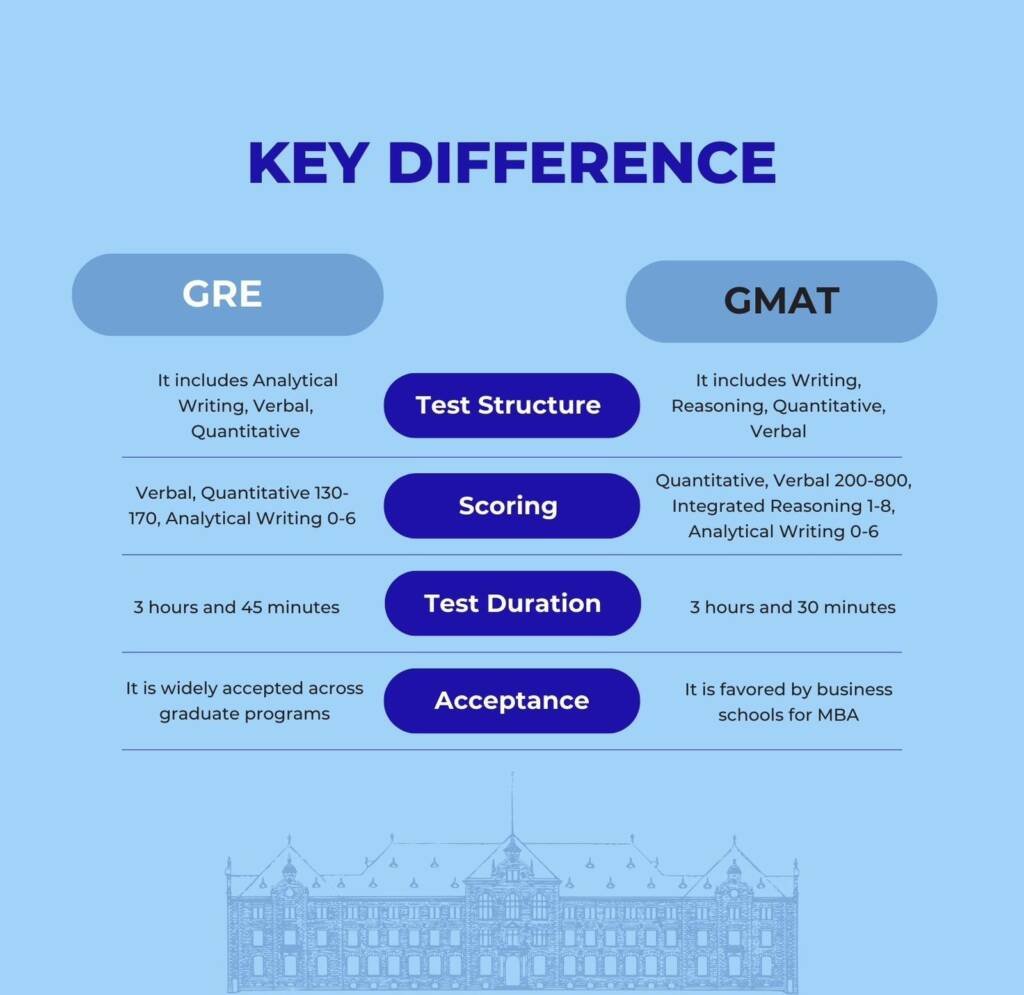When planning your journey to graduate school, choosing the right standardized test can play a pivotal role in your application process. The Graduate Record Examinations (GRE) and the Graduate Management Admission Test (GMAT) are the two primary exams accepted by graduate programs worldwide. Each test caters to different types of programs and student strengths, and deciding which one to take can significantly impact your admission prospects.
Understanding GRE and GMAT
The GRE, administered by the Educational Testing Service (ETS), is required for admission to most graduate schools and a growing number of business schools. It measures a broad range of abilities from verbal and quantitative reasoning to analytical writing and critical thinking across various disciplines.
In contrast, the GMAT, conducted by the Graduate Management Admission Council (GMAC), is tailored specifically for business schools. It assesses analytical writing, quantitative, verbal, and integrated reasoning skills, focusing on analysis and decision-making capabilities crucial for business and management.
Key Differences Between GRE and GMAT
Test Structure and Content:
The GRE includes sections on Analytical Writing, Verbal Reasoning, and Quantitative Reasoning. It focuses on high school level math and general verbal skills. The GRE’s Analytical Writing section requires test-takers to complete two essays, which involve analyzing an issue and an argument.
The GMAT, on the other hand, features an Analytical Writing Assessment, Integrated Reasoning, Quantitative, and Verbal sections. Its unique Integrated Reasoning section evaluates your ability to process information from multiple sources, a skill vital for business environments. Unlike the GRE, the GMAT’s Quantitative section emphasizes data sufficiency problems, requiring a different strategic approach.
Scoring:
GRE scores range from 130 to 170 for both Verbal and Quantitative sections, while Analytical Writing is scored from 0 to 6. The GMAT scores from 200 to 800, combining the Quantitative and Verbal scores; Integrated Reasoning is scored from 1 to 8, and Analytical Writing from 0 to 6.
Test Duration and Pacing:
Both exams require significant stamina, with the GRE lasting approximately 3 hours and 45 minutes, and the GMAT about 3 hours and 30 minutes. However, the GMAT is often perceived as more intense due to its stringent time constraints, especially in the Quantitative section.
Acceptance:
The GRE’s broad acceptance across various graduate programs makes it a versatile choice if you’re considering multiple fields of study. Conversely, the GMAT is predominantly recognized by business schools and is preferred if you are committed to pursuing an MBA or other business-related degrees.

Which Test Should You Take?
Your decision should align with your academic and career objectives. If your aspirations lie firmly within the realm of business, the GMAT should be your choice due to its specialized focus and widespread acceptance in business schools. However, if you’re still weighing options across different fields, or targeting programs that accept either test, the GRE offers more flexibility.
Evaluate your own skills and preparation style as well. If you excel in diverse verbal reasoning and complex writing, the GRE might suit you better. If you are strong in quantitative problem solving and data analysis, the GMAT could play to your strengths.
Both the GRE and GMAT are rigorous exams that require serious preparation. The choice between the two should be guided by your specific educational and career goals, as well as your personal strengths and the specific requirements of the programs you wish to enter. By understanding the key differences and strategic considerations of each test, you can make an informed decision that enhances your chances of success in your graduate school applications.
Navigating the complexities of graduate school admissions, including the decision between the GRE and GMAT, can be daunting. To optimize your preparation and application process, consider leveraging the expertise of Hiral Doshi. With years of experience in guiding students through their educational journeys, Hiral offers personalized consulting services that can help clarify your goals, strengthen your application, and enhance your test preparation strategy. By collaborating with Hiral, you’ll gain invaluable insights and support tailored to your specific needs, ensuring you present the strongest application possible to your desired programs. Don’t navigate this critical phase alone; Click Here and set the foundation for your academic and professional success.






